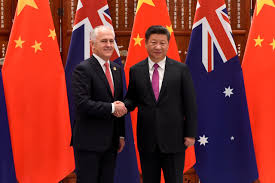Commentary: Don’t let hawks abduct China-Australia friendship

Beijing; The Australian Strategic Policy Institute (ASPI) has recently fabricated a report claiming China uses talent-recruitment programs to gain technology from abroad through illegal or non-transparent means.
This is not the first time the Canberra-based think tank has concocted and hyped anti-China topics — last time it faked an absurd report related to the Xinjiang issue. Over the past years, the institute has been trying so hard to depict China as the biggest threat to Australia, in hope of demonizing China, fomenting anti-China hysteria, and pushing bilateral ties into an abyss.
Its hawkish stance and inflammatory remarks have indeed become a roadblock on the road toward a sound China-Australia friendship: businesses and universities are scrutinized for any cooperation with China; politicians are suspected of any China connection; and entrepreneurs and research fellows are criticized of being bought if they say something good about China.
In an article titled “The think tank behind Australia’s changing view of China,” the Australian Financial Review quoted former Premier of New South Wales Bob Carr as saying that the ASPI pumped out a “one-sided, pro-American view of the world,” and veteran international editor Tony Walker as saying that its “dystopian worldview” has left “little room for viewing China as a potential partner.”
Ironically, the China hawk, which has repeatedly accused China of wielding covert influence in Australia, is actually an agent of foreign influence. Advertising itself as “independent” and “non-partisan” on its official website, the ASPI is in fact much funded by transnational arms dealers, high-tech companies and even foreign government agencies.
The latest report on China’s talent-recruitment programs, for instance, received 145,600 U.S. dollars from the U.S. Department of State. Besides, Lockheed Martin Corporation, U.S. manufacturer of AGM-158C Long Range Anti-Ship Missile which the Australian government has decided to acquire to advance its maritime strike capability, is also an important sponsor of the ASPI.
Then how can the institute’s academic credibility not be seriously questioned? Historically, ever since China and Australia established diplomatic relations in 1972, the two sides have witnessed rapid development of bilateral ties, especially via economic cooperation and cultural exchanges, which has brought tangible benefits to both countries and their peoples.

China is now Australia’s biggest trading partner, crucial source of foreign investment and major source of tourists and overseas students. Amid the current COVID-19 pandemic, China can play an important role in helping Australia recover from its most serious economic recession, as global solidarity and cooperation are vital to winning the fight against the disease.
Fortunately, quite a few Australians have already realized that a healthy and stable China-Australia relationship serves the fundamental interests of both peoples and those of the whole world, and urged the government to remain vigilant about such ill-intentioned institutes as the ASPI.
“Australia cannot and will not decouple from China’s economy,” wrote John Edwards, former member of the board of the Reserve Bank of Australia, in an analysis published on Aug. 20 by Australian think tank the Lowy Institute. Australian Foreign Minister Maris Payne also said last month that the Australia-China relationship is “important” and “we have no intention of injuring it.”
Indeed, Australia needs to look at China and its development in an objective and rational perspective, and weigh up what is best for both countries and the world. Do not let the ASPI or any other China hawk abduct the sound bilateral friendship.





